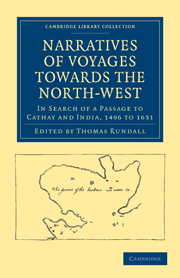 Narratives of Voyages Towards the North-West, in Search of a Passage to Cathay and India, 1496 to 1631
Narratives of Voyages Towards the North-West, in Search of a Passage to Cathay and India, 1496 to 1631 Book contents
- Frontmatter
- Contents
- Introduction
- Narratives
- SEBASTIAN CABOTA
- SIR MARTIN FROBISHER
- MASTER JOHN DAVIS
- CAPTAIN GEORGE WAYMOUTH
- MASTER JOHN KNIGHT
- MASTER HENRY HUDSON
- SIR THOMAS BUTTON
- JAMES HALL
- CAPTAIN GIBBONS
- BYLOT and BAFFIN
- CAPTAIN HAWKRIDGE
- CAPTAIN LUKE FOX
- CAPTAIN JAMES
- CONCLUSION
- APPENDIX: SUPPLEMENTARY NOTES
- POST-SCRIPTUM
- Plate section
SEBASTIAN CABOTA
Published online by Cambridge University Press: 05 October 2010
- Frontmatter
- Contents
- Introduction
- Narratives
- SEBASTIAN CABOTA
- SIR MARTIN FROBISHER
- MASTER JOHN DAVIS
- CAPTAIN GEORGE WAYMOUTH
- MASTER JOHN KNIGHT
- MASTER HENRY HUDSON
- SIR THOMAS BUTTON
- JAMES HALL
- CAPTAIN GIBBONS
- BYLOT and BAFFIN
- CAPTAIN HAWKRIDGE
- CAPTAIN LUKE FOX
- CAPTAIN JAMES
- CONCLUSION
- APPENDIX: SUPPLEMENTARY NOTES
- POST-SCRIPTUM
- Plate section
Summary
This voyager states, that he arrived in the city of London while he was very young, though “having, neverthelesse, some knowledge of the letters of humanitie, and of the sphere.” From his account it further appears : his father died “in that time when newes were brought, that Don Christopher Colonus Genuese had discovered the coasts of India.” This event, it is added, caused “great talke in all the courte of Henry VII; insomuch that all men, with great admiration, affirmed it to be a thing more diuine than humane, to sail by the west into the east, where spices growe, by a way that was never knowen before.” Stimulated by the fame of this noble achievement, and hoping to rival in renown the successful Genoese, the young Cabota resolved to attempt some enterprise of note. “Understanding, by reason of the sphere”, that if he should sail by the Northwest, he might be enabled to reach India by a shorter route than Columbus had pursued, Cabota determined to make the attempt, and “caused the king to be advertised” of his “devise”. Without hesitation Henry VII acceded to the suggestion, and placed at the command of the adventurer two caravels, furnished with all things appertaining to the voyage, and manned with sufficient crews.
As well as he remembers, Cabota sailed early in the summer of 1496. He did not accomplish what he anticipated. What he did effect may be thus succinctly stated. On the 24th of June, about five o'clock in the morning, a “mainland” was discovered, and in front of it an island.
- Type
- Chapter
- Information
- Narratives of Voyages Towards the North-West, in Search of a Passage to Cathay and India, 1496 to 1631With Selections from the Early Records of the Honourable the East India Company and from Mss. in the British Museum, pp. 4 - 6Publisher: Cambridge University PressPrint publication year: 2010First published in: 1849
